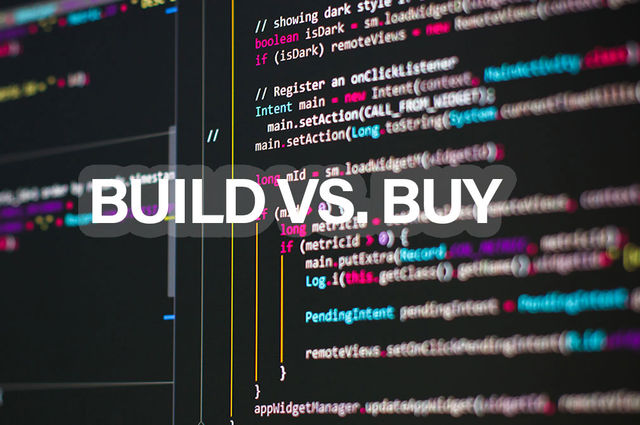Should hoteliers develop in-house or outsource IT applications and solutions?
19 experts shared their view
Some hoteliers (brands & management companies) believe that developing tech solutions in-house is cheaper and provides better customization to the hotelier's concrete needs and control over the ongoing maintenance and performance. Another school of industry-thought believes that hoteliers should focus on their core competencies: providing the best customer experience and best returns possible to ownership and outsource technology applications, products and solutions to specialized vendors.
So the question is, in this era of rapid technological advancements and adoption of next-gen technologies such as AI, IoT, automation, robotics, blockchain, etc., should hoteliers keep technology developments in-house or outsource to specialized, well-funded vendors?
Building tech in-house can be cheaper and can provide more customized solutions, but only if you know what you are doing and you invest properly. You need to understand how to build software and, more importantly, how to maintain it. It is never an "invest and rest," you will always be enhancing and fixing bugs. That said, I think you should feel comfortable investing here for the right projects. I don't mean huge things like a PMS, but perhaps a service that automates certain tasks in your PMS via its API, or your own website and mobile app. Extend or enhance things to make your company more efficient.
There seems to be a general fear of building things in-house, and a desire to have someone else be responsible for maintaining it, but it isn't that hard if you treat it the same way you would if you were going to build a hotel. Find the right people, plan it out the right way, and invest in it properly and you can have tech that works exactly how you want it to, instead of having to work around limitations in existing software.
This is definitely a divisive topic within hoteliers and extremely subjective - so what follows is my personal view: Buy what you can, build what you can't. If a product/service/platform is commoditized to the point that there are various providers in the market, it's unlikely (not impossible) that hoteliers will be able to add value by building that particular piece of technology. That's not to say that a well thought out technology platform that is 100% tailored to the operations of a particular business won't do well - however, most hotel companies are not structured to successfully build that kind of tech.
Competitive advantage cannot be bought - and this is where I advocate building. At Red Planet, we chose to build our own middleware layer to connect disparate systems because we alone know how, where, and why data needs to move. In certain areas, we have not successfully commoditized technology due to such a varied set of requirements across companies.
However, before embarking on a journey to build tech, tech leaders must build awareness and get buy-in from the organization on the work involved. When you build tech, you are actually responsible for maintaining and growing that piece of technology for as long as you use it. A tech platform is never "done" and building any tech means committing the organization to the long-term upkeep of that tech.
It depends on the company's size and what they are building. However, in the large majority of cases, it makes more sense to buy than build. When you buy, you have less control over functionality and it is slower to get changes made, but you benefit by speed to market and the enhancements that come from all user ideas.
The build-or-buy technology question is hard to answer if you're part of a software development organization, but harder still when you represent a proprietary user community – even a sizable or highly specialized one. The argument is traditional: stick to your knitting. A hotel company may not be the best judge of software design, documentation and long-term maintenance. A hotel company rarely opts to build its own beds; why would it write its own software systems?
Then there's the hybrid approach, where a hotel company begins with a vendor solution and augments vendor code with custom add-ons. Specialized proprietary code seems faster and cheaper than vendor modifications, especially when asking a vendor to halt their progress in the broader marketplace to accommodate the idiosyncrasies of a single customer. Thus begins a cycle of isolation and irreconcilable differences which I've seen last for decades in some edge cases. The outcome seems inevitable: the customer can no longer take vendor enhancements because custom touchpoints cannot be discarded or easily readapted. The vendor leaves the self-supporting loners behind as updates the baseline app, adding new data components, features, regulatory requirements, security patches and platform capabilities.
Also, like professionally developed applications, the cost of maintaining custom solutions spirals ever upward: more mass and greater complexity requires more staff, a deeper level of analysis and testing and more support resources. Eventually the customer can no longer justify the expense of simply maintaining the status quo, so a search for a new software base begins. To quote Lewis Carroll's Red Queen, “…it takes all the running you can do to keep in the same place. If you want to get somewhere else, you must run at least twice as fast as that!”
A large chain may have more resources better suited to development in house. This requires a high level of funding, process maturity, infrastructure and deep skill sets. In return for the customisation and control they get over the environment, they also take on the responsibility to make sure they are incorporating all of the legal, statutory, and regulatory requirements, no small task these days! Smaller chains won't have these same resources and will definitely not want to take on the risk and liability to make sure privacy by design, PCI, and GDPR are built in. Even if they had a small development team, there is a higher risk having that in house knowledge in the hands of just a few people. What happens if someone takes a job with a new company, gets a long term illness, etc? Better for the small hotel companies to outsource to professional companies with a proven reputation, and specific skill sets focused on this rapidly evolving next gen space.
For a smaller hotel management company like us, we cannot afford in-house developments - not budget- and not resource-wise. We will always look to partner with vendors for technologies that help us achieve our operational and financial goals.
I would always be an advocate of buying 'off the shelf' solutions where possible, and I believe it is becoming increasingly easier to do this, although there is still a way to go! With the rate of change in technology, I am more comfortable relying on solutions that are used by other hospitality experts, which should, in theory, allow for a wider group to impact research and development.
To develop your own solutions, a big and expensive team of specialists is required. A typical software development cycle has project managers, product managers, developers, testers, security specialists, DBAs, and functional and technical analysts involved, amongst others. For most of us the first question would be 'can we even afford to develop our solutions in-house?'
But even if the answer is 'yes' I don't believe this is the way to go in most cases. Relying on vendors means that you have a much broader choice of technology to pick from and most of the time they are more cost effective, more innovative and better at it than we are. And if you don't like them, you can always change...
A problem with vendors may be that they are not as invested in your company's success as your own employees would be. To counter this, a contract with performance clauses is key. I also like to keep critical jobs like project and product managers in-house. If you are worried about the service to your customers it's worth considering to keep your service team in-house as well.
This is a tough one. Yes hotel companies should concentrate on being hotel companies but if we look into why they have in the past built their own systems it is probably due to existing ones not meeting their requirements, overly expensive and poor integration with other systems and lack of ongoing support (what industry people have told me). So basically born out of frustration of existing off the shelf solutions. Today where the new breed of technology solutions are taking a more open and collaborative approach, Open API's and with a more cloud computing platform it makes sense to go with off the shelf solutions. With 5G around the corner, AI and IoT coming our way there will also be a new wave of solutions for hotels run their operations.
I'm squarely in the camp that hoteliers should outsource to professional IT partners. I remember in one of my previous hotel companies that a senior ops director seriously suggested that we should develop our own PMS. I had to remind the exec team that PMSes take tens of millions of dollars/pounds and many years to develop, and there are a hundred PMSes out there, many of which have very low usage. Hotels should exploit the best tech around, whether it be cloud PMSes, RPA, Business Intelligence or mobile app development toolkits. Hotels should focus on delivering operational excellence and world-class guest experiences, and not on writing code.
I am a firm believer that hoteliers should stay focused on their core competencies to prosper in today's complex, hyper-dynamic environment. Unfortunately, technology is not and has never been one of hotelier's core competencies. Practically all of today's best-of-breed hotel tech solutions are provided by third-party tech vendors: from PMS, CRS, RMS, CRM, CMS, ORM, Smart Rooms, eConcierge, Self-Service Kiosks, etc.
Today's hospitality is being transformed into a 100% digital technology-enabled industry powered by online, mobile, cloud, IoT, AI and blockchain tools and applications. Digital technology is making its way into every aspect of the industry: hotel operations, guest services and communications, revenue management, distribution, CRM and marketing. Hoteliers need to invest in, understand and operate two categories of guest-facing digital technology:
- Guest Engagement, Acquisition and Retention Technology – these are technology applications focused on engaging and bringing the guest to the property, continuing the conversation pre-, during and post-stay and eventually turning the guest into a loyal and repeat guest.
- Guest Services Technology – these are on-property hardware devices and appliances, and software applications (on premises or cloud-based) that provide or enhance guest services, improve guest comfort and satisfaction and enable smart rooms, customer service and communications.
No wonder hoteliers are overwhelmed by the amount of technology, data and digital solutions and devices needed to operate today's property. Can hoteliers develop all of these technology solutions in-house? Definitely not!Due to the increasing complexity of hotel tech and the need to implement cutting edge technologies like AI, Internet of Things (IoT), Voice Assistants, Chat Bots, Robotics, and Blockchain, hoteliers would need significant investments to staff up, innovate and develop tech solutions in-house. As a result, I believe hoteliers will continue to outsource their tech needs to outside specialized tech vendors.
I don't know the perfect answer. I believe, however, that it is somewhere in the middle, between in-house development at one end of the spectrum and the outsource-style choices of either an off-the-shelf product or commissioned, proprietary development at the other end. Certainly, in most cases, viable off-the-shelf technology options are available from at least several vendors and a sufficient, reliable and affordable one can be secured. When this is determined not to be the case, and either use of a software development partner or in-house development appears to be necessary, they need to be approached with recognition of the inherent risks that both involve. Those risks, with which we are all familiar, include a lack of detailed agreement on the characteristics and capabilities of the deliverable, scope creep, and insufficient talent to deliver the software, among others.
Hotel companies have always felt some software to be sufficiently strategic and customized that it could only be developed in-house. But one hotel company's strategic technology is another's commodity, shareable system. The readiness of IHG to outsource it's Central Reservation System development and operation to Amadeus, while Choice Hotels International felt it necessary to develop and operate its Choice EDGE CRS internally, is a case in point.
Each hotel company must decide which systems provide strategic differentiation. They must consider the likelihood of successful internal development (or of successful project completion by a third party software development company) given the cost, risk and possibly-limited term differentiating longevity of that proprietary development effort.
Procurement of new software, whether from in-house resources or from a third party, is only half of the challenge. The other half, I would suggest, is effective ongoing utilization.
Significant efforts are made to achieve successful implementation. Software functions are understood and applied, operational practices are modified to utilize and benefit from those capabilities.
Extensive understanding and use of the software's or system's functions, however, generally soon begins to decline. Our industry's distributed structure with its semi-autonomous operating units - our hotels - and with its high staff turnover, its often informal system/procedure training for new staff (which too often passes on only a subset of what the predecessor knew) and its lack of recurring formal refresher training combine to result in steadily diminishing awareness of the capability (and potential benefits) of the systems we use.
My concern is that this lack of system awareness and competence erodes both the value we receive from our system investments and our ability to fully serve our guests. When, for instance, I talk with Front Desk Clerks and their Managers, I often ask about their familiarity and comfort with the PMS they use.
Time and again those Clerks tell me that they understand about 15-20% of the system's functions, their Managers say 25-35%. They often comment that they see menus items in the PMS displays they think might offer useful functions; sometimes they lament the lack of capabilities which in fact are available to them but about which they are unaware.
My worry is that we understand too little about most of our systems. When the system is supplied by an external vendor, we rely on them to guide us in system use and enhance it to better serve us. We delegate these important responsibilities when in fact we should commit to active, in-house system management.
By that I mean, the value we receive from the technologies we implement is directly related to our awareness of the available functions and selective implementation of them - which ought to include formal training and retaining for all users, ideally including user competence certification with the more complex of those systems.
How we obtain our systems is important. Hotel companies usually have very limited IT staff capable of system development. In some cases, we should or must use external suppliers, in a few cases we can develop systems ourselves. Regardless of which system procurement path is followed, whether we receive full, or only limited and partial value from our system, will be significantly determined by our management of those systems.
Last October, Hotel Tech Report published a great article around this topic entitled "This is Why Hotel Brands Shouldn't Build Tech in House". The article's author Jordan Hollander, estimates that 1) hotel brands lack the resources to compete with pure play technology companies, and 2) the brands usually underestimate the ongoing effort required to maintain and scale a technology business (let alone multiple business lines and products). The article provides a nice reference to a Starwood $19M related to “technology related expenses” that the firm “decided to absorb” because they couldn't collect from managed and franchised properties.
It's a broad question. Today's technology has a much wider scope in application to our industry. I believe it depends on the scope of the project. For example, if the proposal was to develop from the ground up a property management system (or any core business application) then I fall on the side of core competencies. Most organizations would struggle to harness the global experience, input and resource to bring a functional product to play. The other aspect that is a major factor is time. It takes a considerable amount of time to build a robust set of functionality even in the most ideal circumstances.
Market leaders have invested decades in key operational verticals to deliver a depth of functionality. Time can be shortened but not drastically as only so much can be squeezed down the development pipe. The most popular business applications became so due to robust functionality and scale, benefiting from the input of a multitude of business environments and circumstances. And time.
If the proposal was to develop enterprise reporting capability and information for organizational analysis, then it may be better to do so in house, on the back of a core platform that supports heavy lifting such functionality. In this way, the specific focus, business objectives, measurements and approach to brand and operation can be factored into the information, sets and the manner in which they are analyzed, peculiar to the organization.
Each are significantly different in scale and undertaking. In my view, the latter being more specific or customized to the needs of the organization. Also more practical and achievable.
The most innovative companies today smartly combine flexible and open technology with scalable and modern infrastructure. The world of technology is moving too fast for hotel companies to build (and maintain) technology fully in house. As it is not a core competency, initial investments (and focus) in tech development very often looses steam quickly and as the world moves on, the company finds itself quickly behind the innovation curve which in the end requires significant capital investment to catch up - or move ahead.
Competitive advantage is created by leveraging best in class "off the shelf" technology and adapting it to the particularities of the business/brand/clients served. CIOs today need to establish the right balance between the two.
As the founder of a hotel technology business that was built to make technology open, accessible and meaningful to all hotels, and who's experienced first-hand the challenges that come with developing and scaling hotel technology, here are three major considerations for those with ambitions to succeed as both an in-house IT company and a hotelier:
1. The cost is anything but cheap. Hiring a few developers to build a customized system as a one-off project is one thing. Recruiting and training hundreds of world-class specialists in the fields of design, user experience, infrastructure, engineering, security and application operations, to ensure your customized system evolves at the same pace as the market, is another. Already, many hoteliers are challenged with recruiting and retaining good hospitality staff. Couple this with the very real challenge of a shrinking tech talent pool, and the costs of labor are far from inexpensive – especially when you account for the hidden costs of cloud hosting, investing in the latest best practices (e.g. PCI DSS compliance), maintenance and changing legislation.
Price-conscious hoteliers are best seeking strategic technology partners that can provide the solutions they need at a very reasonable cost – and without the ongoing overheads associated with managing your own technology in-house.
2. Technology moves faster than you can. Should you choose to develop your technology in-house, don't be surprised if it's already out-of-date by the time you complete it. In fact, the world of technology moves so fast, it's not uncommon that the Minimum Viable Product you began with from the outset is not the same MVP you have by the time you believe you're ready for launch.
The truth is: technology is all about speed-to-market, iteration and evolution, and those who believe it is more cost-effective to develop hotel technology in-house are likely guilty of thinking of technology as a one-off, set-and-forget investment.
On the contrary, where once hoteliers would have run fewer systems, today they run several and need each system to work with the other. In order to enjoy the level of automation and seamlessness that hoteliers need to be competitive, efficient and to offer a guest experience that guests have come to expect, it would be counter-intuitive to think of customization and personalization as goals that you achieve once. They're goals you need to meet continuously, and that requires a continuous investment in technology. It's simply not feasible or sustainable for hoteliers to achieve this, on top of the existing demands they have to run their hotel business.
3. Quality requires best-of-breed capability. Vendors wake up thinking about technology. They live and breathe change, and are constantly on the lookout for how their customers (hoteliers) can stay on the bleeding edge of what is happening in the world.
Should you choose to develop your technology in-house, know that your systems will only be as good as the team you hired to build them. Contrast that with a technology company that's employed top tech talent, and is competing to build the best products for your business. As an-house technology team that inherently is required to deliver bespoke solutions rather than innovation, it's impossible to produce features and functionality at the same breadth or quality. What it does mean, however, is that, as a hotelier, you get to choose the absolute best.
You need to look no further than large chains that built Central Reservation Systems decades ago and now look to companies like SiteMinder to boost the distribution capability of their CRS. On their own, it is very difficult for those hotels to keep up with the technological pace of change that we see and experience in the distribution landscape, as well as connect directly to all the channels they need through their own systems – which, again, were not built for scale and would take many, many years to adapt. And, even if those hotels did go down that route, by then they would be out of date again.
I have a strong buy preference personally, however, there are many factors needing consideration before the buy v build decision can be made.
- is this a strategic tool? Does it drive differentiation with your competitive set?
- does it directly drive a top-/bottom-line result?
- will you have the best tools, architecture, and innovation?
- what will modernization and support efforts look like in three years? Is that the best use of your limited capital?
- what's the ideation to run lag time? Is there an alternative product or service that is better/faster/easier/more functional to deploy and manage?
- are you suffering from the Ikea effect?
There are many more questions that come to mind, but in the end, hospitality is about providing superior guest service. By buying technology and tech services, when combined with smart contracting, you are generally able to leverage and benefit from the collective input from the suppliers, drive greater predictability in managing your costs, and retain a degree of flexibility for the future.
Hoteliers, please keep doing what you do best, which is providing exceptional guest experiences to your guests, which I am one of them. And I love you for that! With an ever-increasing pace of technology innovation, it is hard to keep up, and nowadays, keeping up is not enough! The SaaS community model provides great benefits to everyone. Gone are the days of custom development and private releases for big groups that paid for them (I worked for one of those hotel groups in the past). We had a great and tailored product but were bugged down to our own little 'chain' (no names) world and our legacy SOP's, dictated by our systems. The community model brings our industry and guest service forward, and not the one paying the most for customization or one-off, in-house development!
Life long tech investments and systems are a thing of the past. The average age of any new technology is five years. Today technology disrupts verticals and human behavior. The total cost of owning technology has come down considerably with mobile and cloud solutions. Hoteliers should be focusing on creating experiences that will bring back guests. Technology companies, on the other hand, are constantly working on the next big thing. To ensure a competitive edge, technology companies experiment and innovate in a very regular time frame. That's the advantage smart hoteliers get by partnering with tech companies. I believe there needs to be 50:50 participation by technology and domain experts to create great systems.
Smart hotel companies work with technology companies to white label and create solutions for the future. Careful selection of open platform providers is key to create that solution with a difference.



















